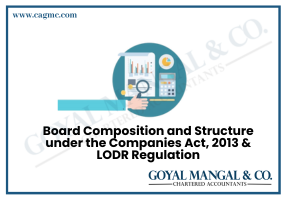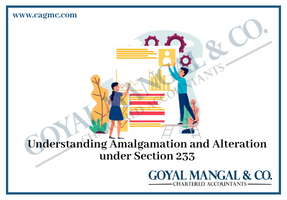 The Companies Act 2013 was introduced to incentivize companies to follow the “Jet Set Go” motto, with compliance and transparency being key. Among the diverse issues outlined in this act, there has been a revolution in Related Party Transactions, a term that has made all companies nervous about the complexity surrounding it for many years.
The Companies Act 2013 was introduced to incentivize companies to follow the “Jet Set Go” motto, with compliance and transparency being key. Among the diverse issues outlined in this act, there has been a revolution in Related Party Transactions, a term that has made all companies nervous about the complexity surrounding it for many years.
|
Table of content |
What is a related party?
Related parties include parent companies, subsidiaries, affiliates, joint ventures, or a company or entity that is controlled or significantly influenced or directed by a person who is a related party. IAS 24 IFRS covers related parties. The objective of IAS 24 is to ensure that an entity’s financial statements contain the disclosures necessary to raise the possibility that its financial position and profit or loss may have been affected by the existence of related parties and transactions and outstanding balances, including liabilities, with such parties.
Who is a related party?
A related party relating to the Companies Act 2013 is here:
- Directors or his relatives.
- key management personnel or their relatives.
- A company in which an executive, or his relative, is a partner.
- A public company in which a director or manager is a director or holds more than 2% of its paid-up share capital with a relative
- A private company in which a member or director is a director or member
- Any company whose board of directors, chief executive, or manager is accustomed to acting in accordance with the advice, instructions, or mandate of the director or manager.
- one individual whose advice, instructions, director, or management is customary for the company
- Any company that is a holding company, subsidiary, or affiliate of that company
- A director or key management personnel of a holding company, it’s subsidiary or affiliate, or a relative thereof
- Any company that is a subsidiary of a holding company is also a subsidiary.
- Any person appointed by the senior management of the company or its holding company, subsidiary, or affiliated company, who is an employee of the company or its holding company, subsidiary company, or affiliated company, and who is the core management team, with the exception of the board of directors, consisting of all members of management one level below executive directors, including functional leaders.
Meaning of related party transaction
The term “related party transaction” refers to a trade or arrangement between two parties that are connected by a pre-existing business relationship or common interest. Companies often seek business deals with parties they know or who have a common interest. Although related party transactions are legal in themselves, they may create conflicts of interest or lead to other illegal situations. Public companies must disclose these transactions.
Important points
- A related party transaction is an arrangement between two parties that have a pre-existing business relationship.
- Some, but not all, related-party transactions carry an inherent potential for conflicts of interest, so they are carefully scrutinized by regulatory agencies.
- Without control, the abuse of related party transactions could lead to fraud and financial ruin for all parties involved.
- US regulators ensure that related party transactions are conflict-free and do not negatively impact shareholder value or corporate profits.
Example of related party transactions
Enron was a US-based energy and commodities company headquartered in Houston. In an infamous 2001 scandal, the company used related party transactions with special entities to help hide billions of dollars in debt from failed business ventures and investments. Connected people misled the board of directors, its audit committee, employees, and the public.
These fraudulent related party transactions led to Enron’s bankruptcy, prison sentences for its executives, loss of employee and shareholder pensions and savings, and the bankruptcy and closure of Arthur Andersen, Enron’s auditor, who was found guilty of federal crimes and SEC violations.
This financial disaster led to the drafting of the Sarbanes-Oxley Act of 2002, which established new and expanded existing requirements for boards, management, and public accounting firms in the US, including specific rules that limit conflicts of interest arising from related-party transactions.
SEBI Governs Related Parties and Related Party Transactions
- SEBI Regulation 49 also sets out certain regulatory requirements for related party transactions. It defines a related party transaction as a transaction that involves the transfer of resources/services/liabilities.
- Its scope is wider than that of the Companies Act 2013. It includes close family members of directors or key executives, a private company in which directors or key executives and their relatives have control or substantial influence.
- Shareholders must approve any related party transaction that is material by special resolution and all related parties will not be allowed to vote on such resolutions.
Need for special approval
- In addition to the board of directors’ approval, the members’ prior approval must be obtained by special resolution before entering into a transaction with a related party. It applied to all related party transactions in the case of companies that paid up share capital of ten million or more.
- Purchase, sale, or supply of any material or goods in excess of 20% of annual turnover, either directly or through the appointment of agents
- The sale or liquidation of any assets in excess of ten percent of the net assets, either directly or through the appointment of agents.
- Leasing property worth more than 10% of one’s net worth
- Using or providing services in excess of 10% of net worth, either directly or through the appointment of representatives
- Compensation for underwriting a deposit of the firm’s securities or derivatives in excess of one percent of its net worth
- In the event of a special resolution of an extraordinary general meeting, no member of the company who is a connected person shall vote on such special resolutions intended to approve any arrangement into which the company may enter. A special resolution passed by the holding company will be deemed appropriate for entering into transactions between the wholly-owned subsidiary and the holding company.
Conclusion
As the economy globalizes, the numerous processes in the research and development, manufacture, sale, and distribution of goods or services increasingly are performed by separate entities within a multinational group and the flow of products and services through intercompany transactions frequently involves two or more countries. In these circumstances, the related party transactions become very important for a company, all the more so as they bear a lot of implications in various fields.







